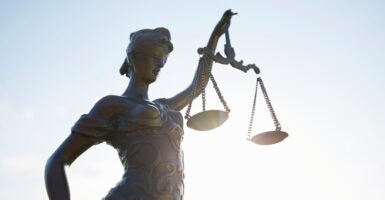“The remedy for racism never is more racism.” That’s the guiding principle behind a new initiative called the Equal Protection Project.
Through education, investigation, and litigation, the Equal Protection Project is working to expose instances of racism in America, such as a school district in Rhode Island that announced it was holding an event for non-white educators only.
“I mean, racism’s been around in various forms for a long time, but now it’s done in the name of diversity, equity, and inclusion,” says Bill Jacobson, founder and publisher of LegalInsurrection.com.
That’s a reference to the likes of Ibram X. Kendi, who in his book “How to Be an Antiracist” insists, “The only remedy to racist discrimination is antiracist discrimination. The only remedy to past
discrimination is present discrimination. The only remedy to present discrimination is
future discrimination.”
Jacobson announced the launch of the Equal Protection Project on the Fox News Channel “Tucker Carlson Tonight” program on Thursday night.
Jacobson joins “The Daily Signal Podcast” to explain how the Equal Protection Project is working to promote the “fair treatment of all persons without regard to race or ethnicity.”
Listen to the podcast below or read the lightly edited transcript:
Virginia Allen: We are joined today by Bill Jacobson, a Cornell law professor and the founder and publisher of Legal Insurrection. Professor Jacobson, welcome back to the show.
Bill Jacobson: Thank you for having me back. It’s been a while, and I appreciate it.
Allen: Well, this is pretty exciting because today we are talking about a new project that Legal Insurrection has just rolled out with the aim of fighting equity discrimination. It’s called the Equal Protection Project. Professor, would you just take a minute to explain what exactly the mission of this project is?
Jacobson: Equal Protection Project is now Legal Insurrection Foundation’s third project. Our first one is the Legal Insurrection website, which is how most people know us. The second project, which we rolled out two years ago, is criticalrace.org, which has interactive maps and a database of critical race training at all levels of education. But the new one we just rolled out is the Equal Protection Project, which is equalprotect.org. The mission there is really to fight what I think of as the newest form of racism.
I mean, racism’s been around in various forms for a long time, but now it’s done in the name of diversity, equity, and inclusion. Probably the best way to illustrate what we’re dealing with here is, our first project at the Equal Protection Project is legally contesting a new teacher hiring incentive program at the Providence, Rhode Island, school district, which is the largest in the state, where newly hired teachers can get student loans forgiven, but only if they are non-white. So white teachers cannot apply for that program. We’re contesting that.
That’s what I mean by the newest form of racism. There are, unfortunately, a fair number of people in the various DEI industry components who think that discriminating against white people is OK, that it’s not as bad as discriminating against non-white people. We reject that. So our mission statement is that there is no good form of racism and that the answer to either past or present racism is not more racism. That’s what our mission is, to fight against what I refer to as equity discrimination.
Allen: Was there a specific moment when you realized, “We need the Equal Protection Project”? What was that, that launch into, “Yes, this is something that we have to do”?
Jacobson: Well, a lot of it has to do with our criticalrace.org website, which is mostly database-driven. We do have some resources, but it’s mostly a resource for people. And we get a lot of tips there. We’ve been for two years now getting tips about this sort of discrimination that’s going on throughout education, corporations, and government. We never were able to act on them. We could report on them, but we couldn’t act on them.
Then I think it was probably the Providence, Rhode Island, school district situation and said, “We’ve got to do something. If public school districts are openly and unabashedly discriminating on the basis of race and using diversity, equity, and inclusion as the justification for it, and if government officials are actually participating in it, the Providence school district has been taken over by the state of Rhode Island.”
So this is essentially the state of Rhode Island discriminating. We can no longer just report on it. We can no longer just document it. We need to take that next step. So I think Providence, there’s a whole multitude of race discrimination problems in the Providence school district, but that I think was the triggering moment last fall when we said, “We just can’t sit back anymore. We have to do something.” And that gave rise to Equal Protection Project and equalprotect.org.
Allen: Well, and like you say, you-all for a long time have been shining a light on these issues. You’ve been reporting on it. And that still is part of that mission that you want to be educating people just on what is happening, but you’re taking it a step further with this litigation aspect, which you’ve touched on. But talk about that a little bit more. I mean, what is ahead for you-all in relation to taking legal action and filing lawsuits?
Jacobson: Well, legal action can be a lot of different things other than filing lawsuits. Certainly that’s sometimes necessary. But I understand, having been in private practice as a litigator before I joined Cornell for 22 years, how messy that process is. But sometimes you have to do it. So it could be, we’re still going to shine a light. Sometimes publicity alone is enough to stop a practice. Sometimes it’s sending a warning letter.
So getting back to the Providence school district—we got a tip from somebody, because now teachers in the system who were afraid to speak out know to reach out to us, that there was going to be an educator-of-color meetup that was organized by the district. This is not just people getting together on their own. So an official government function which was segregated. It was only open to non-whites. The signup form, you had to list your race or ethnicity, and being white wasn’t one of the ones you could list. And it was being held at an event space in Cranston, Rhode Island.
So we wrote to the event space and we said, “Calling to your attention because you probably don’t know, you just rented space to the district. This is a segregated event. Here’s the proof of it. And you are subject to the Rhode Island public accommodations law. And under the Rhode Island public accommodations law, you would actually be potentially liable for hosting a discriminatory event even if you didn’t organize it.” Well, lo and behold, that put an end end to that event.
I wish I could have been a fly on the wall, but all of a sudden that event was not being held at that event space. And all of a sudden Providence is announcing, because we managed to get some local media coverage, “Oh, that was all a mistake. All these forms, we didn’t mean what we said.”
So that’s an example of things we will do that don’t necessarily involve a lawsuit. There are a lot of laws that are out there that people can utilize. Public accommodations is a very underutilized law because virtually any public space is going to fall under that. So that’s one thing we might do.
We might do complaints to the U.S. Department of Education if it’s an educational institution, or the [Equal Employment Opportunity Commission], or the state attorney general—who, in most states, has enforcement authority for the anti-discrimination laws. So that’s another thing we’re going to be doing.
A lot of that wouldn’t necessarily involve a lawsuit, but sometimes you are going to get recalcitrant people who don’t want to just stop doing what they’re doing, and we will file lawsuits to the extent we can file them. In the name of the Legal Insurrection Foundation, we will do that. But sometimes you need another plaintiff. You need a plaintiff with standing, so to speak. That’s very hard to get because, again, getting back to Providence, there’s a number of teachers who’ve reached out to us and they’re just scared to bring a claim against the district because they know there will be retaliation, they know it could be career-ending, and then they’ve got to hire a lawyer.
So there’s a lot of fear. But we will, to the extent there is a plaintiff, we would arrange for them to get counsel. We would not necessarily represent them ourselves. So one of the things we’re doing at the Equal Protection Project is creating a lawyer network. People will be able to go to the website. Lawyers, you’re not committing yourself to anything, and we’re not committing anything to you, but we now have a list.
So if somebody in Iowa, for argument’s sake, contacts us through the website, we would at least potentially have somebody to refer them to there. Or if we want to help somebody more directly, we would be able to get local counsel.
So we’re going to confront people lawfully. We’re going to expose them. But if all of that doesn’t stop the problem, and if a state attorney general is not willing to act and fulfill the attorney general’s responsibility, we will sue people. But that would be our last resort. But it has to be there, and so that’s one of the things we’re planning to do.
Allen: Professor Jacobson, how do you think we got to this moment in history? Because we’re seeing, obviously, this moment in history where there is this great focus on being anti-racist and on equality in all of these things. Yet we have, like you’ve mentioned, school districts that are trying to hold events that are only for people of color. How have we wound up at a moment where we need an organization like the Equal Protection Project?
Jacobson: It was both a long time coming and a short time coming. The long time coming is, you’ve seen this building over the years. A lot of people talk about critical race theory and its variations. And one of those variations is what’s called anti-racism, which is a completely misleading term the way they use it. OK? It’s Ibram Kendi’s “How to Be an Antiracist” and it advocates for current discrimination to remedy past discrimination. So it is an ideology that explicitly calls for current discrimination.
And that has become the philosophy. It started on the campuses, as a lot of things do, and now has spread to the broader culture where you have this concept that you measure group results. And if there is any difference in group results, that means it must be racism if it’s a non-white group that is not performing as well. Of course, we know that’s not true, and we could have a whole discussion on why that’s not true. But the point is, that ideology took over, that we are a systemically racist country. That emanates from critical race theory.
That led to the so-called anti-racism discrimination that has become really embedded in the diversity, equity, and inclusion industry, which is a multibillion-dollar industry. So people believe that you need to essentially have racial retribution. That you have to punish and discriminate against white people in order to remedy other problems. Of course we don’t agree with that because that violates not only the Constitution, it violates laws at the federal government way down to local ordinances like the public accommodations law.
The big lie of the diversity, equity, and inclusion industry is that we are a systemically racist country. In fact, we are a systemically not racist country. From the Constitution down to local ordinances, we prohibit and make unlawful discrimination on the basis of race. We need to enforce those laws.
So what we plan to do is do our best as a nonprofit entity to help enforce laws that already embed non-racism into our system. And to push back against the people who are very powerful and very well funded, who want to take us back to the 1950s and back to the 1940s. But they want a different victim. The only difference between what’s going on now and the 1950s is which racial group is the victim. That, to us, is a societal dead end. That is not where we should be heading. We have to adopt the principle that’s in the Constitution that everybody is entitled to the equal protection of the law.
Allen: Well, and you’ve been raising concerns for a long time over critical race theory trainings in schools, of teachers, classes on college campuses. So two years ago, as you mentioned earlier, you-all launched the critical race database that includes over 500 educational entities in higher ed, K-12 schools, medical schools, military services. And really the goal of that was to expose how these learning institutions are requiring critical race theory classes and trainings. What was the response that you received from launching that project two years ago?
Jacobson: Mostly positive. I mean, I certainly have negative responses over the years to many things I’ve done. But shockingly, there was a fairly moderate response to that because we’re simply documenting things. It’s a database. Every single piece of information in the database has a source. And the sources are universities themselves and schools themselves. They love to brag about this stuff. So we simply document it. We have researchers who spend their days going through university websites and documenting what they say they are doing, so the data is actually completely neutral.
Putting yourself out there on the internet is not always the most pleasant experience. In our inbox at the criticalrace.org website, on any given day we get people accusing us in not pleasant terms of promoting critical race theory or being racist because we oppose it. The reason they can’t tell is because the data is just the data. People can do with it what they want.
So the response to that has been positive. We have over 100, I think it’s up to about 125 now, media links to it. We’ve done all that without a publicist. So these are people who use the database. We’ve had approaching 3 million page views to the website in two years and over 7 million user actions. User actions are not just page views but when they click on the resources that we have, the links that we have. So it’s a utilized website.
It has received almost uniformly positive media coverage. The reaction at Cornell, the school newspaper wrote it up, was fairly muted because it is what it is and nobody can dispute what we’re showing. So that has actually been a fairly positive experience and has led to a lot of media coverage, but also, a lot of invitations to community groups where I simply discuss what is happening. You can like it or you can dislike it. Now, obviously, we do have a position, we’re against it. But that doesn’t affect the data that we have.
Allen: Now, you mentioned you’re at Cornell, and throughout your time there you’ve obviously been doing so much work, Legal Insurrection, and with launching the critical race database, and now with the Equal Protection Project. What is the response from students, from faculty and staff at Cornell to the work that you’re doing?
Jacobson: It’s hard to say because there is on every university campus, and Cornell’s no exception, a culture of fear. Surveys confirm this. So my anecdotal interactions with students and staff, less so with faculty, is that they’re afraid to speak their minds. So I get a lot of private praise, but I don’t get a lot of public praise, and that’s OK. Sometimes there’s negativity.
As you know, because I was on your show two years ago in June, there was an attempt to get me fired and a whole lot of nastiness. I rode out that wave with the help of going on your show and other shows talking about what’s happening. It’s always good not to be isolated.
So I don’t know what they really think about me. I’m an anomaly there. On the entire law school faculty I’m the only openly political conservative. I mean, there might be others who maybe think of themselves economically conservative, whatever, but they’re not out there. In the entire Cornell University, which I think has approximately 1,700 people they call faculty at different levels, I am really the only one who is politically out there.
That’s good and bad. A lot of people don’t talk to me, don’t want to be associated with me, but a lot of people do. I am the faculty adviser to almost every right-of-center student group on campus. I’d love to think it’s because I’m so wonderful, but the reality is, there’s nobody else.
I mean, I am the faculty adviser to the Cornell chapter of the Network of Enlightened Women because apparently they couldn’t find an enlightened woman on the faculty to be their faculty adviser. And that’s great.
So I in many ways relish the role that I play on campus. But I wish I wasn’t the only one. I wish I wasn’t alone out there. That’s a problem throughout higher ed. It’s a monoculture. It’s a liberal culture. And frankly, the students are probably more diversified in their viewpoints than the faculty are. The faculty is approaching 100% who are left-leaning. Some are really far-left-leaning, some are just your standard liberals. But it’s a monoculture, and it’s not getting any better. It’s getting worse.
Allen: Well, the website, for those who want to learn more about this project, it’s equalprotect.org. But, professor Jacobson, if there’s a teacher listening or someone listening from anywhere across the country and they’re thinking, “Oh my goodness. There was an instance at my school, or in my community, that kind of looked like discrimination, and I would love to get some insight on this, get some thoughts from a legal perspective,” what would be the steps that they should take?
Jacobson: I’d say it would depend upon what the nature of the problem is. If it’s a very specific employment practice problem, you probably should consult a local employment lawyer about that. We at Equal Protection Project are more looking at systemic problems, policy problems, things that affect large numbers of people. That doesn’t mean we’re not willing to look at things that are person-specific, but you’re probably best off with a local employment lawyer if you’ve been fired and you need to file a claim.
But if you know a practice in your school district, like the Providence discriminatory teacher loan forgiveness practice, we want to hear about that because that will affect a lot of people. At least in terms of what we are equipped to do, that’s what we are really looking to do. To fight the systemic racism of the equity agenda is what we are looking to do. We have a contact form at our website, and you can contact us, and we can take it from there.
Allen: Excellent. The Equal Protection Project, you can learn more at equalprotect.org. Professor Jacobson, thank you so much for your time today. We really appreciate you coming on and sharing about this new project with us.
Jacobson: Yeah, it’s great to be on. This is one of the best podcasts there is out there, so I always want to come on your podcast. Thank you for having me on again.
Have an opinion about this article? To sound off, please email [email protected] and we’ll consider publishing your edited remarks in our regular “We Hear You” feature. Remember to include the url or headline of the article plus your name and town and/or state.
































